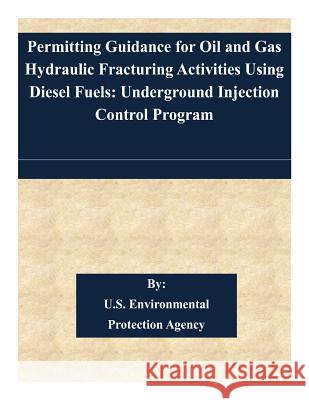Permitting Guidance for Oil and Gas Hydraulic Fracturing Activities Using Diesel Fuels » książka
Permitting Guidance for Oil and Gas Hydraulic Fracturing Activities Using Diesel Fuels
ISBN-13: 9781508848752 / Angielski / Miękka / 2015 / 48 str.
This guidance provides technical recommendations for protecting underground sources of drinking water (USDWs) from potential endangerment posed by hydraulic fracturing (HF) activities where diesel fuels are used. The U.S. Environmental Protection Agency (EPA) developed this guidance for EPA permit writers to ensure protection of USDWs in accordance with the Safe Drinking Water Act (SDWA) and Underground Injection Control (UIC) regulatory authority. This authority is limited to when diesel fuels are used in fluids or propping agents pursuant to oil, gas and geothermal activities. This document does not establish any new permitting requirements for HF activities using diesel fuels, but describes the EPA's interpretation of existing legal requirements as well as non-binding recommendations for EPA permit writers to consider in applying UIC Class II1 regulations to HF when diesel fuels are used in fracturing fluids or propping agents. This document does not address geothermal activities. The EPA expects that EPA UIC Program Directors, and the permit writers acting on their behalf, will follow the interpretation of the statutory term "diesel fuels" presented in this guidance document. They should also consider, although are not required to follow, the recommendations reflected in this guidance on how to apply the Class II regulations to HF activities using diesel fuels when issuing permits for such activities under the federal UIC Program. Recommendations are consistent with the discretion accorded under the existing UIC Class II regulations, and reflect existing UIC requirements for other well classes, voluntary industry standards, state rules, and other model guidelines for HF. However, permit writers, acting on behalf of the UIC Director have the discretion to consider alternative approaches that are consistent with statutory and regulatory requirements. Decisions about permitting HF operations that use diesel fuels will be made on a case-by-case basis, considering the facts and circumstances of the specific injection activity and applicable statutes, regulations and case law. Under the 2005 amendments to the SDWA, a UIC Class II permit must be obtained prior to conducting the underground injection of diesel fuels for hydraulic fracturing. The EPA, where it directly implements the program, as well as states and tribes with primary enforcement authority, must issue a Class II permit prior to the injection of diesel fuels in the HF fluid or propping agents. The primary audience for these technical recommendations is the EPA Regional offices directly implementing the existing UIC Class II Program requirements (40 Code of Federal Regulations (CFR) parts 124 and 144 through 147). Stakeholders and the public have recognized the importance of safely and responsibly managing unconventional oil and gas development, including hydraulic fracturing. Many states have updated their oil and gas regulations and a variety of organizations have developed model guidelines and best practices. The EPA engaged with states, tribes, industry, and other stakeholders during the development of this document and reviewed best practices available at the time. The EPA used information from these efforts to inform this guidance for the UIC program.
Zawartość książki może nie spełniać oczekiwań – reklamacje nie obejmują treści, która mogła nie być redakcyjnie ani merytorycznie opracowana.











